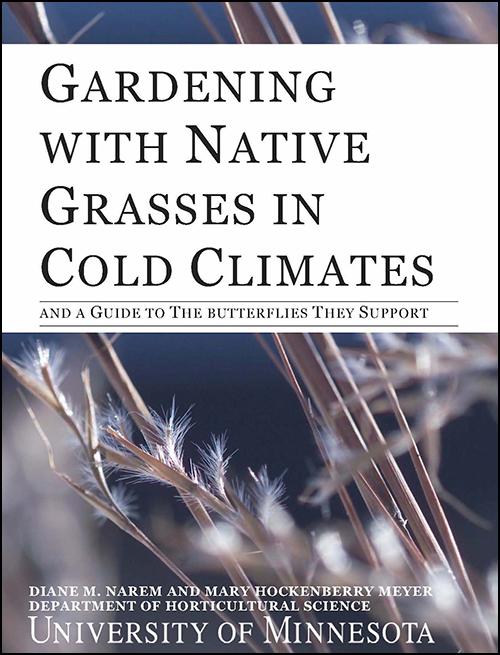Grasses and Butterflies: A New E-Book Explains Connections
While many gardeners plant coneflowers, milkweed, black-eyed Susans and other blooming plants to help butterflies, ornamental grasses are also vital to the eco-system of these important creatures. A new, free e-book by Prof. Mary H. Meyer and Diane Narem describes the best ornamental grasses for cold climates AND which ones are most used by butterflies.

Called Gardening with Native Grasses in Cold Climates and A Guide to the Butterflies They Support, the 73-page e-book is available for free. The book begins with a discussion of native grasses of the Upper Midwest (as well as related plants such as sedges) and their uses in ornamental gardens, both as a low-maintenance plant option and as a benefit to wildlife in your yard. The growth cycle, types of grasses and relationships with moths and butterflies are covered in-depth and with helpful charts and photos throughout. The authors do a great job of explaining cultivars of native plants (so called nativars) and both their uses and the reasons some native plant advocates prefer to use straight species plants.
They then go grass-by-grass through the options gardeners have, explaining site conditions, growth habit and which species of butterflies rely on the grass. I was surprised to find that some plants—palm sedge and tufted hairgrass, for example—have no butterflies that use them. Others, such as my favorites little blue stem and prairie dropseed, host many types of butterflies.
The book also covers how to pair grasses and perennials to create the most butterfly-friendly landscape you can.
Like all e-books, this one allows the user to take notes, travel to other websites from the book and search for topics within the book. As I finished going through the book, I could not help but wonder if high schools teach botany anymore. I don’t think many do, and that’s too bad, because this e-book would provide easy-to-understand information about plants and how they operate in an ecosystem with other creatures. That’s knowledge we all can use.

Hi I like horticulture and want to go to school for it and I’m wondering if they any jobs that pay good I’n mn or is it just a hobbies?
There are lots of jobs in horticulture. Check out https://www.seedyourfuture.org/
So, nothing for PC/Android?
Sadly, not at the moment.
“That’s knowledge we all can use.” Great statement, then why isn’t this knowledge in a Kindle Book or pdf format for all to use. It is a “Free” book, so shouldn’t be any strings attached such as you need to have an Apple product to get it.
This book is now available to download at no cost in a variety of formats from the U of MN: https://open.lib.umn.edu/nativegrasses/?fbclid=IwAR2lXNtRcIveTjM6SokJBXkBorib7t7mMnqt-lUWCRq3Eq0BqXsbR7lvqE0